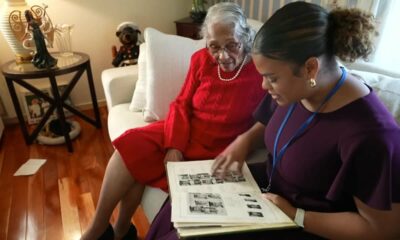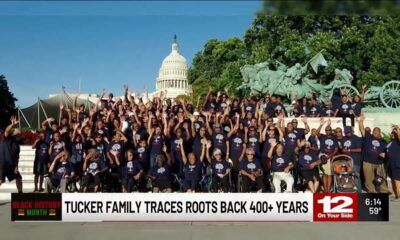Mississippi Today
Meet the 2 Candidates for Mississippi Supreme Court’s Nov. 26 Runoff Election

On Tuesday, Nov. 26, voters will determine who will hold one of central Mississippi’s three seats on the nine-member state Supreme Court. This 22-county area includes Hinds County and Jackson.
Justice Jim Kitchens is seeking a third, eight-year term on the high court. State Sen. Jenifer B. Branning is the challenger.
The state Supreme Court often has the final say in cases involving criminal, civil and death penalty appeals, questions on the state’s laws and constitution, and legal issues of public interest. It hears appeals from lower courts, such as the chancery and circuit courts. The court decided 260 cases in 2023 and issued rulings in 2,656 motions and petitions.
The Marshall Project – Jackson and Mississippi Today compiled information about each candidate to help you make an informed decision at the polls.

Admitted to Mississippi Bar: 1967
Residence: Crystal Springs, Copiah County
Relevant experience: Completing second term as Supreme Court justice; 41 years as practicing attorney, including nine as district attorney of Copiah, Walthall, Pike and Lincoln counties.
Campaign finance: As of Oct. 10, his campaign committee has raised $288,502, mostly from trial lawyers, and spent $189,675, leaving the campaign with $98,827. Read the latest report here.
Statement of economic interest: Kitchens and his wife are partners in a real estate company, Kitchens Properties, LLC, in Copiah County. Read the latest report here.
Kitchens was first elected to this seat in 2008, after more than 40 years practicing law, which includes nine years as a district attorney across four counties. He is one of two presiding justices, who have the most years on the bench, following the chief justice. Presiding justice is a role on the court’s executive committee that includes administrative duties, such as enforcing the court’s deadlines, and presiding over panels during oral arguments.
Campaigning at the 2024 Neshoba County Fair, Kitchens stressed his experience in the courtroom, especially on criminal cases, and promised impartiality.
Kitchens said he is “the guy that carries his oath of office around in his pocket as a daily reminder of what he swore to do. That oath teaches me that I’m not supposed to care whether people before the court are rich, poor, Black, White, Republican, Democrat, Libertarian or Independent. And I don’t care.”
Mississippi College of Law Professor Matthew Steffey described Kitchens as a “middle-of-the-road centrist.” On the bench, Kitchens’ dissents have keyed in on what the justice called oversteps in judicial power and scrutinized prosecutorial decisions.
Kitchens wrote a partial dissent on the decision about House Bill 1020, calling the creation of the court in Hinds County a “fiction of convenience that overreaches our judicial function, and of ultimate importance, our constitutional duty.” He also joined a dissenting opinion in the case that killed Mississippi’s ballot initiative.
Ensuring defendants who can’t afford representation have court-appointed lawyers is a theme throughout Kitchens’ career. He was the chair of the Public Defender Task Force, which was created in 2000 to study and make recommendations on the public defender systems in the state. In a 2018 interview with Mississippi Today, Kitchens expressed support for a more well-organized and adequately funded state public defender system for Mississippi.
The bulk of Kitchens’ campaign donations through Oct. 10 have come from trial lawyers. In addition to Mississippi attorneys, the campaign also received contributions from lawyers as far away as Oregon and Pennsylvania. In the three months since the July finance report, Kitchens’ campaign raised over $200,000, more than it had previously raised in the entire race. He has also received an endorsement from the Southern Poverty Law Center, an advocacy group specializing in civil rights litigation.

Admitted to Mississippi Bar: 2004
Residence: Philadelphia, Neshoba County
Relevant experience: State senator since 2016.
Campaign finance: As of Oct. 10, Branning’s campaign committee has raised $665,624, including a $250,000 loan from the candidate, and spent $343,728. The campaign reported a balance of $319,876, which left a discrepancy of about $2,000. Read the latest report here.
Statement of economic interest: Branning is listed as member, owner, stockholder or partner in several companies located in Philadelphia, including her law firm, Branning Properties, LLC, and Triple E Investments. Read her latest report here.
Republican state Sen. Jenifer B. Branning is running on a platform to represent Mississippians’ conservative values on the Supreme Court, she said at the 2024 Neshoba County Fair candidate forum.
Branning has no judicial experience. Since she joined the Mississippi Bar in 2004, she has practiced as an attorney, primarily representing businesses through her private practice in areas including real estate development, banking and agribusiness. She has also served as a special prosecutor in Neshoba County, a guardian ad litem in Neshoba and Winston counties, and as a staff attorney in the Mississippi Secretary of State’s Division of Business Services & Regulation.
Branning described herself as a “Christian conservative.” She has been endorsed by the state’s Republican Party and the National Federation of Independent Business Mississippi PAC, a special interest group for small businesses. She has been outspoken about overturning Roe v. Wade and supporting the state’s abortion ban, and about reducing taxes on businesses. Branning is also a member of the National Rifle Association. On criminal justice issues, Branning has voted in favor of mandatory and increased minimum sentences for crimes including shoplifting, motor vehicle theft and fleeing law enforcement.
In the state Senate, Branning chairs the Highways and Transportation Committee. She has touted her record on lowering taxes and reducing regulations on farmers and small business owners.
Branning comes from multiple generations of business owners in Neshoba County. Her grandfather, Olen Burrage Jr., owned and operated a truck farm, hauling timber and corn, according to previous news reports.
Her election committee has received contributions from political action groups including Truck PAC, Mississippi Petroleum Marketers & Convenience Stores Association PAC and the Mississippi REALTOR PAC.
Much of Branning’s campaign funding, however, comes from the candidate herself. She kicked off her campaign with a $250,000 candidate loan. She has also bankrolled her previous senate campaigns, with candidate loans as high as $50,000 in 2018. This year, her campaign committee also received funding from other Republican politicians and their campaign funds, including Lt. Gov. Delbert Hosemann, the Committee to Elect Jeremy England (state senator), Harkins for MS (state Senator Josh Harkins), and Friends of Jason White (Mississippi House speaker).
Branning did not acknowledge or return the candidate questionnaire from The Marshall Project – Jackson and Mississippi Today.
This article first appeared on Mississippi Today and is republished here under a Creative Commons license.![]()
Mississippi Today
House chairman pushes for absentee ballot expansion instead of early voting

Elections Committee Chairman Noah Sanford has successfully pushed some House members to scrap a Senate proposal to establish early voting in Mississippi and expand the state’s absentee voting program instead.
Sanford, a Republican from Collins, last week got the committee to adopt a plan clarifying voters who anticipate their employers might require them to work on Election Day and adding that people who care for children or disabled adults can vote by absentee.
“I’m the poster child for this,” Sanford said. “I’ve got a 5-year-old, a 2-year-old and a 9-month-old. I can promise you, you don’t want me bringing them into the polling place. They’d be knocking something over, and it would be a bad experience for all of us.”
The plan passed the Elections Committee with no audible opposition, and it can now go before the full House for consideration.
Sanford’s proposal also establishes an early voting task force, although Sanford held a hearing over the summer to study the issue. It also allows election workers to process absentee ballot forms leading to Election Day.
To vote by absentee, a voter must meet one of around a dozen legal excuses, such as temporarily living outside of their county or being over 65. Mississippi law doesn’t allow people to vote by absentee purely out of convenience or choice.
The Senate passed a proposal, authored by Republican Sen. Jeremy Englad of Vancleave, that would have established 15 days of no-excuse, in-person early voting and required voters to present a valid photo ID to an elections worker.
Sanford told committee members that the Senate proposal does not have enough support from House members needed for it to pass. If the House passes Sanford’s proposal, it would return it to the Senate for consideration.
Mississippi is one of only three states that do not have no-excuse early voting or no-excuse absentee voting.
This article first appeared on Mississippi Today and is republished here under a Creative Commons license.![]()
Mississippi Today
Mississippi Today is moving its offices to downtown Jackson
Mississippi Today is moving its offices to downtown Jackson
Mississippi Today, the state’s flagship nonprofit newsroom, is moving its offices to downtown Jackson from Ridgeland.
For us, this move is more than just a change of address — it’s a reflection of our belief in Jackson’s promise. In late February, we announced the launch of a team of reporters focused on covering the city of Jackson. We believe strongly that the success of the entire state of Mississippi relies on the success of Jackson.
READ MORE: Mississippi Today announces new team of reporters to cover the city of Jackson
Downtown Jackson, in particular, is Mississippi’s heartbeat. The values represented in this neighborhood are the values that define the people of the entire state: creativity, determination, perseverance, and a tangible sense of community. By investing in this space, we’re investing in the people, businesses, and leaders who are already shaping the city and state every day. And we hope to be representative of a proud next chapter that breathes life into this important place.
Our new home will be in the historic Lamar Life Building, one of Mississippi’s most iconic landmarks. Opened and dedicated in 1925 — exactly 100 years ago — it was the state of Mississippi’s first skyscraper and remains a symbol of Jackson’s growth and resilience.
This building boasts an important literary and media history. A young Eudora Welty, working for her father’s life insurance company, began her lifelong pursuit of storytelling and photography in the building. It was also home to Mississippi’s first network radio station, WJDX, and it also once housed Lamar Broadcasting Television, now known as WLBT. We are proud to build upon these legacies.
Our office, which is currently being renovated, will not only provide a comfortable home for the largest newsroom staff in the state that is already doing so much work downtown at the state Capitol and at City Hall. It will double as a community gathering place and venue for the live programming that Mississippi Today does so well. We want our space to regularly bring people downtown, and we will work to host events that every Mississippian will find engaging.
Stay tuned for more updates as we settle into our new home. We couldn’t be more excited to continue our work from the heart of Mississippi.
This article first appeared on Mississippi Today and is republished here under a Creative Commons license.![]()
Mississippi Today
Podcast: Retired educator, PERS board member McCoy warns of proposed changes to state employee retirement system

Dr. Randy McCoy, a retired longtime public school superintendent and member of the state employee retirement system board, says a plan passed by the Senate aimed at financially stabilizing PERS would cause long-term problems in hiring and retaining teachers and other state employees. He says the system can be shored up with less drastic reductions in benefits for future employees.
READ MORE: As lawmakers look to cut taxes, Mississippi mayors and county leaders outline infrastructure needs
This article first appeared on Mississippi Today and is republished here under a Creative Commons license.![]()
-

 News from the South - Virginia News Feed4 days ago
News from the South - Virginia News Feed4 days agoVirginia woman getting ready to celebrate 100th birthday: 'I have really enjoyed life'
-

 News from the South - Arkansas News Feed7 days ago
News from the South - Arkansas News Feed7 days agoFederal actions threaten Arkansans’ employment, more job cuts expected
-

 News from the South - Missouri News Feed6 days ago
News from the South - Missouri News Feed6 days agoSt. Peters HOA spends thousands suing homeowners for their fences
-

 Mississippi Today5 days ago
Mississippi Today5 days agoSenate passes redistricting that puts DeSoto Republican, Tunica Democrat in same district, calls for 10 new elections
-

 News from the South - Virginia News Feed7 days ago
News from the South - Virginia News Feed7 days agoTucker family traces roots back for over 400 years
-

 News from the South - North Carolina News Feed6 days ago
News from the South - North Carolina News Feed6 days agoDays after woman, 2 children stabbed to death, Fayetteville community still in shock
-

 News from the South - Tennessee News Feed6 days ago
News from the South - Tennessee News Feed6 days agoHemp industry fears slate of restrictive bills could gut industry
-

 News from the South - Texas News Feed6 days ago
News from the South - Texas News Feed6 days agoShocking audio reveals moments before Southwest plane nearly collides with jet













































